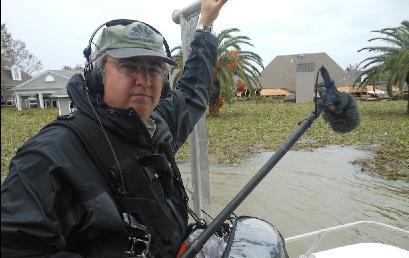Network News Sound |
|
There may not be a more demanding or unforgiving way to charge through life then to walk the road of Network News coverage. I'm now past the quarter century mark and counting... Yikes!! Of course we don't just do network news but we are always part of a unique situation. A two person crew who walks, often blindly, into what they will encounter on that coming day and routinely wears many hats. We cut our teeth on breaking news however and that is the genre that lays the foundation for the way we think and the approach we use in sound recording. |
||
Its not unusual to start your day with a 5am crew call for morning live shots and this is most likely the most relaxing time of day for you. It is also the start of your thought process. It doesn't matter how many guest you have on the show. You hit the bird with a mono mix (several redundant mono mixes actually) whether its 1 or 5 guests. It either sounds good or it doesn't. The show wraps and you move on. You're either fired or your aren't. By the time the morning shows are wrapped, NY has decided on the direction they want to take for that nights broadcasts. The correspondent you're assigned to is most likely hopping from foot to foot because there is one truth in television news. No crew... No air time. By 11am you're in overdrive fulfilling your assignment, sit down interviews, MOS's (in tv thats 'man on the street'), boat rides, helicopter tours and so on. All with the desire to maintain the highest quality possible. That means you're busting your ass and you're probably doing it in a very unfavorable situation. |
||||||
 |
||||||
Hurricane Isaac in New Orleans - Rock Center / Dateline NBC |
||||||
By 1 pm a tape runner appears to collect what you have acquired so far and they head off to the nearest sat truck to begin feeding tape. These days an alert goes out as to the feed time with descriptors allowing any additional producers to scan the downlink at their work stations. Editorial comments are flowing back from New York and ground sources are explored as the story begins to solidify. 2 pm and you're in the show... "A" block. Correspondent heads towards the sat truck to begin writing the piece and we head out for one more bit of sound or breaking coverage. 3 pm and we're handing off the last of our footage. (hopefully) For us the torch has been passed and we downshift into standby as the editors crash the story. Most of the time we're looking for some food and coffee and waiting to hear if we're live in the show or if we're heading back out to shoot a standup as well as being the crew that will respond immediately to any breaking developments that occur. 5pm and its go on the live, remember the weather probably sucks huge, so we build our live hit set location and fax out with the control room. 5:30 Final script approval (yeah right) and the correspondent cuts the VO (voice over) track in the truck. Yes VO's are really cut in the back of a satelite truck with a Coles 4104 Lip mic! 6:20pm wire & IFB's all around! 6:30 The show goes on the air and countdown to live begins. 7pm The show wraps and we await word if we're goodnighted or if there is a west coast update. Now thats a rather longway around the barn to get to, 'Why we think the way we do'. |
||
When you come up in this world you learn very early that if you don't want it on the air. Then don't give it to them. There is no audio post who will a-b your tracks or massage over some rough moments. An example... Your correspondent is wearing a wire and you're about to do MOS's, I'd lose the wire and boom everything. A wire with a 3ms delay and a boom do not make for good bed fellows in a crash edit and remember your tracks might not wait until the edit bay to get screwed... They could be summed in the uplink or the downlink which means you're toast before the editor even hears the first syllable! In short, we learned our craft truly mixing in mono with an attitude that says '1' is all you get. You either get it or you go home. I constantly encourage mixers to listen to the cans in mono. You can spot check iso's all you want but if you have a good mono mix... Life is golden! Which brings me to why I'm writing this piece. "Being a great mixer is knowing what sounds good and what doesn't as it applies to the situation you find yourself in..." - Thom Shafer |
||
Home ----- Photos ----- Tech Tips ----- Credits/Reel ----- Contact Me |
||
www.televisionsound.com / Thom Shafer |
|